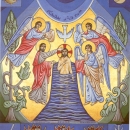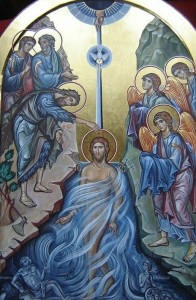
In our Maronite Church the “Season of the Glorious Epiphany (Denho)” begins on January 6th, on the Feast of the Baptism of the Lord. It is known in Syriac as Denho.
Maronites and many Eastern Christian churches celebrate the feast of the Epiphany of Jesus Christ, focusing on the Baptism of Jesus by St. John the Baptist. The Feast of the Epiphany of Our Lord is a major feast in our Eastern Tradition. The importance of Christ’s baptism is described in the Gospels of apostles Matthew, Mark, Luke and John and is the first manifestation of the Holy Trinity to mankind. Epiphany/Theophany comes from the Greek word “Theophania” which means appearance of God or manifestation of God.
An important part of the feast is the blessing of holy water, which signifies Jesus’ baptism in the Jordan River.
Our Heavenly Father Himself, with His mighty voice and with the assistance of the Holy Spirit in the form of a dove, said of His only-begotten Son, Jesus Christ, with these words, ‘This is my beloved Son in whom I am well pleased.’ God said these words while Jesus was standing in the Jordan River. And most of the people who gathered on the banks of the Jordan to hear the sermons of St. John the Baptist heard and observed this unique presentation, thus making this feast the first feast in the Christian church before Christmas was introduced as a separate feast, according to St. John Chrysostom.
Through baptism in the name of the Father, the Son and the Holy Spirit, we become the children of God and heirs of the heavenly kingdom. Only Holy Baptism can liberate us from the bondage of Original Sin, and the holy water possesses the power that casts away evil.
The Epiphany water is blessed with a lighted charcoal which signifies the fire of the Spirit who entered the Jordan River at Christ’s Baptism. In our Maronite liturgy, this is the meaning of the ritual of immersing the inflamed charcoal in the water. It is like mixing fire and water, the fire represents divinity and the water represents our life or the material world. Symbolically, when our Lord went into the water to be baptized by Saint John the Baptist, he sanctified the water, the essential element of life. The water symbolizes the origin of creation and of every creature which is in need of sanctification through the Holy Spirit. This water is then sprinkled on the congregation by the priest reminding them of their own baptism in which they put on a robe of Christ and were cleansed from their original sin. The water is also taken home and can be sprinkled or consumed so that the Holy Spirit may sanctify us and our material world submitting everything to the will of God.
In addition to Jesus’ baptism, Theophany in the some churches traditionally included the Nativity, the wedding feast at Cana, the visit by the Magi and the presentation of Jesus in the Temple as a child, all of which indicate in some way the manifestation of God on Earth.”
In Maronite culture many people wait to have their babies baptized and confirmed (chrismated) on or around Denho.
However, for all Syriac Christians, Denho is a time to reflect on the consequences of at least the first two stages of our Initiation, namely, what happened to us by being baptized (incorporation into the Church, the Body of Christ; and the door to life in the Holy Trinity being opened); and in Chrismation (Confirmation) and outpouring of the Gifts of the Holy Spirit (wisdom, knowledge, understanding, courage, counsel, piety and holy fear), leading us to experience the Fruit of the Holy Spirit (joy, peace, love, gentleness, self-control, patience, kindness, faith, etc.).”





No comments yet.
Only registered users can comment.